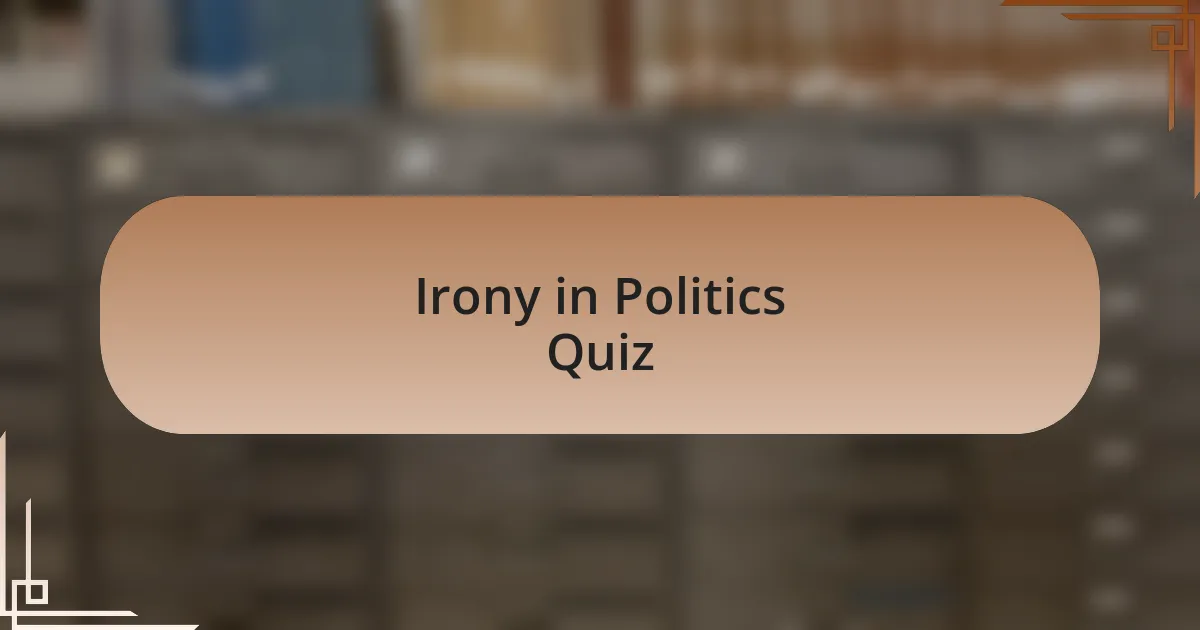Start of Irony in Politics Quiz
1. What is the primary function of irony in political discourse?
- To entertain without providing any real information.
- To create division among different groups.
- To confuse the audience with exaggerated claims.
- To persuade people by making political speeches more compelling.
2. How do politicians use irony in their speeches?
- Politicians use irony to attack opponents and amuse the public.
- Politicians use irony to confuse the audience and obscure facts.
- Politicians use irony to avoid addressing issues and making promises.
- Politicians use irony to make speeches longer and more tedious.
3. What is the difference between humor and irony in political speeches?
- Humor is light-hearted and creates a comfortable atmosphere, while irony is critical and aimed at a specific object.
- Humor is used exclusively by comedians, while irony is reserved for politicians.
- Humor is always sarcastic and meant to offend, while irony is purely factual.
- Humor focuses on personal anecdotes, while irony deals only with statistics.
4. Can you provide an example of Donald Trump using irony in a speech?
- `I am sure Hillary is going to laugh quite a bit tonight, sometimes even at appropriate moments.`
- `I have the best words, believe me!`
- `We`re going to make America great again!`
- `Nobody knows the system better than me!`
5. What is the role of irony in creating public solidarity?
- Irony creates division by mocking those outside the group.
- Irony eliminates the need for meaningful dialogue and consensus.
- Irony helps in expanding the public imagination for who is included under the sign of “we”.
- Irony serves only to confuse the audience and distract them from issues.
6. How does irony contribute to the negative representation of the other in political discourse?
- Irony serves primarily to amuse the audience without impacting political representation.
- Irony contributes to the negative representation of the other by reversing attitudes about social actors to draw a positive self-image.
- Irony acts mainly as a tool for uniting opposing sides in political debates.
- Irony enhances camaraderie and fosters positive relationships among political groups.
7. What are the three dominant modes of irony?
- Verbal irony, physical irony, and environmental irony
- Situational irony, dramatic irony, and creative irony
- Sarcastic irony, comical irony, and humorous irony
- Literal irony, abstract irony, and emotional irony
8. Can you explain situational irony in the context of politics?
- Situational irony refers to a humorous event that delights everyone involved.
- Situational irony happens when the audience is the only one confused about the situation.
- Situational irony is when everything goes as planned without any surprises.
- Situational irony occurs when what is expected to happen doesn’t happen, such as when the least-qualified person wins an election.
9. How did Donald Trump’s presidency present a challenge to satirists?
- He only tweeted inspirational quotes.
- He made everyone laugh uncontrollably.
- He promised to lower taxes for everyone.
- He was both absurd and terrifying.
10. What is ironic irony in the context of satire?
- Ironic irony means using humor to make people laugh without any deeper meaning.
- Ironic irony refers to the use of irony to convey an ironic representation.
- Ironic irony is when something is literally what it seems without any twist.
- Ironic irony is a type of poetry that lacks any irony at all.
11. How did Trump’s Twitter response to a *SNL* skit reveal his intentions?
- He intended to promote *SNL* skits featuring him.
- He aimed to increase his followers on Twitter.
- He sought to collaborate with the show`s writers.
- He wanted to silence critics of his presidency.
12. What is the relationship between irony and satire in politics?
- Irony and satire are completely unrelated concepts with distinct purposes.
- Irony is primarily designed to entertain without any political implications.
- Irony is closely related to satire in politics, often used to reveal the truth and expose absurdities in reality.
- Irony is a literary device that has no connection to political satire.
13. Can you provide an example of how irony can be misused in politics?
- The use of irony always ensures politicians are taken seriously during discussions about policy.
- Irony is primarily used to build stronger relationships between politicians and their supporters.
- The misuse of irony can lead to an infantilization of public discourse, contributing to a feeling that nothing matters and everything is about `spin.`
- Irony can enhance public trust in politicians and encourage open dialogue about governance.
14. How does irony contribute to a feeling of nothingness in public discourse?
- Irony only serves to lighten the mood in discussions and has no serious impact.
- Irony can create a meta-attitude that fosters indifference and sarcasm.
- Irony enhances clarity and helps people understand issues better.
- Irony makes conversations more profound and encourages deep reflections.
15. What is the impact of excessive irony on public life?
- Excessive irony improves public discourse.
- Excessive irony encourages political engagement.
- Excessive irony leads to more thoughtful debates.
- Excessive irony can clog up serious discussion.
16. How does irony relate to the concept of postmodernism in academia?
- Irony in academia is seen as a means to critique conventional knowledge and challenge established narratives.
- Irony in academia serves to confuse students and make lessons unnecessarily complicated without value.
- Irony in academia is only used for comedic purposes and to entertain students and faculty.
- Irony in academia is primarily a tool for promoting conspiracy theories and misinformation.
17. What is the significance of irony in the context of democratic pluralism and evidence-based reasoning?
- Irony is significant because it creates jokes that confuse voters about political issues.
- Irony is significant as it helps politicians laugh at each other`s failures without any serious discussion.
- Irony is significant in politics only to entertain the audience during debates.
- Irony is significant in democratic pluralism and evidence-based reasoning because it involves taking others’ good-faith descriptions of the world into account.
18. Can you explain the concept of liberal irony?
- Liberal irony is a way to mock opponents without engagement.
- Liberal irony means making political jokes that confuse the audience.
- Liberal irony is when politicians show certainty in their beliefs.
- Liberal irony refers to acknowledging one`s beliefs as contingent and subject to change.
19. How does irony help in expanding the public imagination?
- Irony distracts the public from serious issues and deepens misunderstandings.
- Irony helps in expanding the public imagination by providing a compelling and accurate description of how we are living.
- Irony limits public imagination by creating confusion about reality.
- Irony stifles creativity and discourages new ideas in society.
20. What is the ethical imperative of practicing irony in politics?
- To confuse voters and create chaos.
- To entertain audiences for profit.
- To manipulate facts and distort reality.
- To model liberal values and expand imagination.
21. How does irony contribute to the negative representation of the other?
- Irony fosters understanding between opposing groups by highlighting common goals and aspirations.
- Irony negates the importance of the other by promoting shared values and increasing empathy.
- Irony enhances positive perceptions of the other, allowing them to fit within societal norms and values.
- Irony contributes to the negative representation of the other by reversing attitudes about social actors to draw a positive self-image.
22. What are the co-textual markers of irony in political discourse?
- Co-textual markers include anecdotes and similes.
- Co-textual markers include hyperboles and repetitive follow-up commentaries.
- Co-textual markers include metaphors and alliterations.
- Co-textual markers include idioms and euphemisms.
23. Can you provide an example of how politicians use hyperbole to mark irony?
- An example of how politicians use hyperbole is when a candidate claims to be the best person ever, which is not believable.
- An example of how politicians use hyperbole to mark irony is when Romney is described as a very talented person, which is the opposite of what is intended, based on his previous acts.
- A politician claiming they can fix everything in a day is an example of using hyperbole.
- Politicians might say they`re the most honest person in history, which is often an exaggeration.
24. How does irony help in creating bonds and defusing aggression?
- Irony is solely about making jokes without any deeper meaning.
- Irony helps in relieving tension and forming connections among people.
- Irony only serves to confuse audiences and create division.
- Irony does not affect relationships and only complicates communication.
25. What is the relationship between irony and ridicule in political discourse?
- Irony and ridicule are closely linked as they both enhance the impact of political communication.
- Ridicule is purely negative, while irony is only for positive messages.
- Irony and ridicule are opposites and serve different purposes in speeches.
- Irony serves no purpose in ridicule and is only used for humor.
26. Can you explain the concept of dramatic irony in politics?
- Dramatic irony is when politicians use exaggerated humor to entertain the audience during speeches.
- Dramatic irony happens when politicians make contradictory statements without realizing it.
- Dramatic irony occurs when the audience knows more about the situation than the characters, such as when the audience is aware of a politician’s true intentions but the public is not.
- Dramatic irony refers to politicians mischaracterizing their opponents to gain support in debates.
27. How did Trump’s presidency present a unique challenge to satirists?
- He only focused on serious issues.
- He never made a joke.
- He always played it safe.
- He constantly changed reality.
28. What is the significance of Trump’s relationship to satire?
- It made satire less relevant in politics.
- It encouraged a more serious tone in satire.
- It required satirists to adapt their tools.
- It eliminated the use of humor in political commentary.
29. Can you explain the concept of creative irony in politics?
- Creative irony refers to the routine use of humor in every political speech.
- Creative irony occurs when a politician`s message is contrary to the literal meaning, revealing deeper truths.
- Creative irony is merely repeating someone else`s statements to seem clever.
- Creative irony is when politicians avoid controversy to appeal to everyone.
30. How does irony contribute to the preservation of a politician’s image?
- Irony helps politicians avoid public speaking duties entirely, keeping them out of the limelight.
- Irony contributes to the preservation of a politician’s image by reversing attitudes about social actors to draw a positive self-image.
- Irony ensures that politicians always receive applause, no matter their actions.
- Irony makes politicians appear invisible to the public, enhancing their mystique.
Congratulations on Completing the Irony in Politics Quiz!
Well done! You’ve navigated through the twists and turns of political irony. We hope you enjoyed the process as much as we enjoyed creating it for you. Irony in politics is often a rich source of humor, revealing the absurdities of human behavior and decision-making. This quiz might have sparked a few laughs or perhaps even a raised eyebrow or two.
Throughout the quiz, you may have discovered how irony plays a crucial role in shaping political discourse. It can highlight contradictions, challenge expectations, and reveal the sometimes humorous outfall of political rhetoric. Understanding these concepts not only enriches your knowledge but also enhances your appreciation for satire and political commentary. There’s a lot of learning wrapped up in those moments when reality just doesn’t match the narrative.
If you’re hungry for more, don’t miss our next section dedicated to further exploring ‘Irony in Politics.’ It’s packed with insights, examples, and deeper analysis that will surely expand your understanding. Join us as we dive deeper into this intriguing topic! Your journey into the realm of political humor continues here.
Irony in Politics
The Nature of Irony in Political Discourse
Irony in political discourse refers to the expression of meaning through language that signifies the opposite. Politicians often utilize irony to critique opponents or policies. This rhetorical device allows leaders to convey complex ideas succinctly. For instance, when a politician claims to support transparency while engaging in secretive dealings, the contradiction creates an ironic situation that highlights hypocrisy. This form of irony serves as a tool for both humor and critical commentary.
Examples of Ironic Political Humor
Ironic political humor often arises from the contradictions within political statements or actions. Comedians and satirists highlight instances such as campaign promises that go unfulfilled. For example, a politician advocating for job creation while outsourcing jobs abroad showcases irony that resonates with audiences. Humor derived from these scenarios not only entertains but also encourages reflection on political integrity.
The Role of Satire in Exposing Political Irony
Satire plays a crucial role in exposing political irony by using humor to critique power structures. Shows like “Saturday Night Live” employ irony to highlight flaws in political figures. These portrayals reveal the absurdities in political rhetoric and behavior, engaging viewers and prompting critical thought. Through exaggerated representation, satire effectively communicates the dissonance between what is said and what is done in politics.
The Impact of Irony on Public Perception
Irony significantly impacts public perception of political figures and parties. When irony is highlighted in media, it can sway public opinion by underlining inconsistencies. For instance, a politician caught in an ironic situation may lose credibility, as voters begin to question their sincerity. This impact can shift voter sentiment, demonstrating that irony not only entertains but shapes the political landscape.
Ironic Quotes in Political History
Ironic quotes have punctuated political history, offering insight into the complexities of governance. Words spoken in irony often resonate due to their absurdity or contradiction. For example, during a budget crisis, a leader might exclaim about ‘fiscal responsibility’ while increasing spending. Such statements become memorable and are often referenced in discussions about political inconsistency, further emphasizing the role of irony in political communication.
What is irony in politics?
Irony in politics refers to the use of language or situations that convey a meaning opposite to what is expected. It often highlights the absurdity or contradictions within political discourse and actions. For instance, a politician may promise change while enacting policies that maintain the status quo. This contradiction serves to emphasize the dissonance between rhetoric and reality, making it a powerful tool for humor and critique in political commentary.
How does humor enhance the understanding of irony in politics?
Humor enhances the understanding of irony in politics by making complex or uncomfortable truths more accessible. Comedians and satirists often use irony to expose political flaws, inviting audiences to reflect critically on issues. Shows like “The Daily Show” or “Saturday Night Live” use comedic irony to draw attention to political hypocrisy, making the audience laugh while simultaneously provoking thought about serious matters.
Where can one find examples of political irony used in humor?
Examples of political irony used in humor can be found in late-night comedy shows, political cartoons, and satirical websites like The Onion. These platforms often showcase humorous portrayals of political events that underscore the contradictions and absurdities of political decisions and statements. Notable examples include cartoons depicting politicians with exaggerated traits or late-night monologues highlighting ironic situations, such as campaign promises that contradict party actions.
When did the use of irony in political humor become prominent?
The use of irony in political humor became prominent in the 20th century, particularly during the rise of radio and television. Shows like “The Ed Sullivan Show” and later “Saturday Night Live” incorporated irony to critique public figures and policies. The Watergate scandal in the 1970s also played a critical role, as comedians used irony to mock political corruption, demonstrating that humor can serve as a tool for accountability. This trend has continued to evolve with social media, amplifying the reach of ironic political commentary.
Who are notable figures known for using irony in political humor?
Notable figures known for using irony in political humor include Jon Stewart, Stephen Colbert, and John Oliver. Jon Stewart’s tenure on “The Daily Show” was marked by sharp ironic commentary on news and politics. Stephen Colbert’s character on “The Colbert Report” employed irony to satirize the political right. John Oliver continues this tradition on “Last Week Tonight,” using irony to address significant political and social issues, effectively combining humor with critical analysis.


